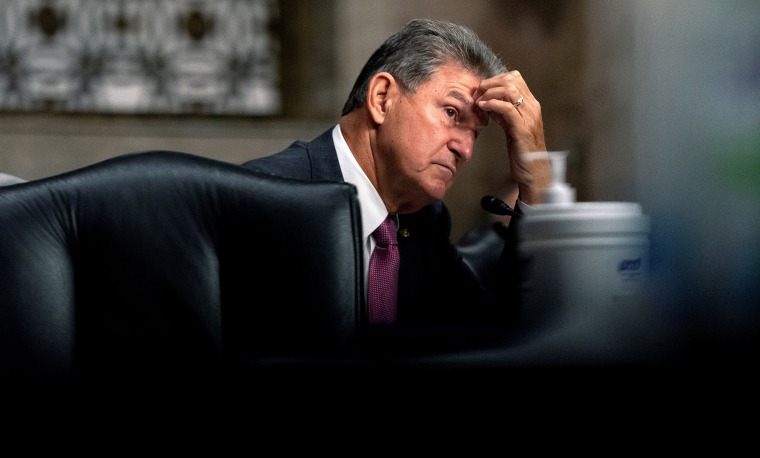President Joe Biden spoke in Glasgow this morning, at the start of the COP26 international climate conference, where the American leader tried to assure foreign leaders that the United States is serious about addressing global warming. In fact, Biden pointed to his Build Back Better agenda as proof, sounding very much like a president who expected his plan to pass and.
"[M]y administration is working overtime to show that our climate commitment is action, not words," Biden said, pointing to the bill pending on Capitol Hill. The Democrat added yesterday that he hoped for a legislative breakthrough this week, "God willing."
His optimism was understandable. By all indications, the House was well positioned to pass both bills — the Senate's infrastructure bill (known as "BIF") and the Build Back Better package — this week. Democrats were feeling better about the initiative than at any time in weeks.
When Democratic Sen. Joe Manchin announced this morning that he'd add fresh "clarity" to his position this morning, some hoped this would be the step needed to seal the deal. If the conservative West Virginian expressed even tacit support for the compromise framework that the White House released on Friday, the agenda would see smooth sailing in the days ahead.
Manchin instead did the opposite. As the New York Times reported:
Senator Joe Manchin III of West Virginia on Monday all but dashed hopes for quick votes this week on President Biden's domestic agenda, saying he would not endorse a $1.85 trillion social policy and climate package without ample time to consider its economic and fiscal ramifications.
All the senator had to do was nothing. If Manchin literally didn't say a word about the bill, the House votes on both bills would've been relatively simple and straightforward. What's more, the West Virginian has reason to be pleased: Democrats have already dramatically scaled back their ambitions, removing key elements of the White House's agenda, almost entirely to make him happy.
Manchin could feel content and take "yes" for an answer.
But he didn't. Instead, the conservative Democrat appeared on Capitol Hill, and demanded that the House pass the bill he wants — the Senate's BIF — and in exchange, he agreed to eventually consider possibly passing the bill Biden and the rest of the party wants. Maybe. At some point. If he's satisfied.
It was difficult to understand the nature of many of his complaints. Manchin lamented the fact that many Democrats won't compromise, despite the fact that Democrats have already compromised, cutting the scope of the bill nearly in half, as part of an effort to create a bill he might accept. He accused others of playing "political games," after months in which Manchin has avoided the kind of direct negotiations that would produce a meaningful result.
The conservative was especially harsh in condemning the Build Back Better plan's finances — he threw around phrases such as "shell games" and "budget gimmicks" — despite the fact that the White House's numbers add up, and when the Congressional Budget Office raised concerns about the BIF's finances, Manchin was entirely indifferent.
He's staring at a win-win: Manchin could get a Build Back Better plan in line with his wishes and send the infrastructure bill he likes to Biden's desk. Instead, he announced that he's willing to kill the president's compromise framework, which will likely make it considerably more difficult to pass the bill he ostensibly supports.
So what happens now? Manchin expects the House to follow his demands, at which point he also expects to see a lengthy analysis of the president's compromise package. None of this will make the senator more trustworthy in the eyes of House Democratic skeptics, whose votes will be necessary to pass the Senate's infrastructure plan.
As for the White House, officials heard Manchin's remarks and reiterated in a written statement that the president is delivering on a plan that meets his needs: "Senator Manchin says he is prepared to support a Build Back Better plan that combats inflation, is fiscally responsible, and will create jobs. The plan the House is finalizing meets those tests — it is fully paid for, will reduce the deficit, and brings down costs for health care, child care, elder care, and housing. Experts agree: Seventeen Nobel Prize-winning economists have said it will reduce inflation. As a result, we remain confident that the plan will gain Senator Manchin's support."
At this point, we're left with a question that's dogged the process for months: What exactly does Manchin want? Does he want to tear down the entire legislative initiative? Does he want to bully the House into submission? Does he expect to lower the price tag on Biden's plan even more? Is this about creating more drama? More attention? More headlines about him clashing with his party?
I honestly have no idea. Manchin vowed to bring "clarity" to his perspective today, but after his "press conference" at which he refused to answer any questions, the light at the end of this tunnel is getting more difficult to see.

